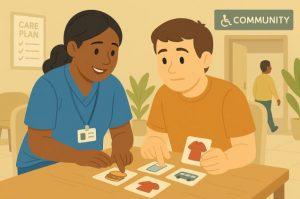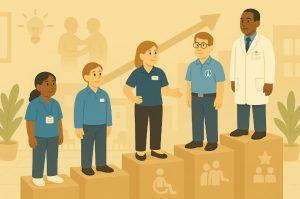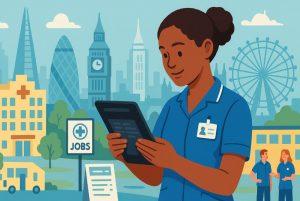Learning disability nurse jobs offer a specialised and rewarding career path within the UK’s healthcare system. These professionals play a vital role in supporting individuals with learning disabilities, helping them lead more independent, healthy, and fulfilling lives.
With growing demand especially in cities like London this field presents strong career prospects, diverse work environments, and opportunities for personal and professional development.
What Does a Learning Disability Nurse Do in the UK?

Learning disability nurses, also referred to as RNLDs (Registered Nurses in Learning Disabilities), play a pivotal role in supporting individuals with intellectual and developmental disabilities. Their work focuses on helping people lead independent and fulfilling lives while maintaining their physical and emotional well-being.
They work across various settings, including hospitals, residential homes, community centres, and schools. These nurses are trained to provide specialist care that considers the holistic needs of each individual. Unlike general nurses, RNLDs tailor interventions to improve daily living skills, manage complex behaviours, and support mental and emotional health.
In London, learning disability nurses often collaborate with multidisciplinary teams including psychologists, occupational therapists, and speech therapists to provide integrated support that enhances quality of life.
How Can Someone Become a Learning Disability Nurse?
To become a learning disability nurse in the UK, individuals must complete a Nursing and Midwifery Council (NMC) approved degree in learning disability nursing. This can be achieved through a full-time university degree or a degree apprenticeship that combines academic learning with hands-on experience in healthcare settings.
Entry requirements typically include five GCSEs (grades A–C), including English, Maths, and Science, along with two or more A-levels or equivalent qualifications. Those already working in health or social care might also consider Access to Nursing courses or NVQ pathways as alternative routes.
Applications for university courses are made through UCAS, with many institutions in and around London offering strong programmes, including King’s College London and the University of West London.
What Skills Are Essential for Learning Disability Nursing Jobs?
Success in learning disability nurse jobs requires a distinct combination of interpersonal and clinical skills. Nurses must be compassionate and patient, as they frequently support individuals who face communication barriers, complex behaviours, or dual diagnoses.
Strong observational and communication abilities are crucial, especially in identifying subtle changes in behaviour or physical health. Teamwork is equally important, as learning disability nurses collaborate closely with families, carers, and healthcare teams.
Moreover, critical thinking and resilience are necessary to manage challenging situations sensitively while maintaining professional boundaries.
Where Can Learning Disability Nurses Work in London?
London offers a wide range of work environments for learning disability nurses, each with its own set of challenges and rewards. Opportunities exist in both public and private sectors:
| Setting | Description |
| NHS Trusts | Community mental health teams, assessment units, general hospitals |
| Local Authorities | Adult social care services, special education teams |
| Private Sector Clinics | Specialist autism and behavioural clinics |
| Charities and NGOs | Organisations such as Mencap, Scope, and Dimensions |
| Educational Settings | SEN schools, universities, or supported learning institutions |
London’s diversity means learning disability nurses often work with individuals from various cultural and linguistic backgrounds, requiring cultural sensitivity and adaptive communication skills.
What Are the Career Progression Options for RNLDs?

Career advancement in learning disability nursing can be both varied and rewarding. Most nurses start at Band 5 on the NHS pay scale. With experience, they may move into Band 6 as clinical specialists or team leaders.
Further progression can lead to Band 7 and 8 roles, such as advanced nurse practitioners, consultants, or service managers. RNLDs can also specialise in areas such as forensic services, autism support, or challenging behaviour management.
Some nurses pursue academic or educational pathways, becoming lecturers or researchers in healthcare institutions, further contributing to the field.
What Is the Salary Range for Learning Disability Nurse Jobs in the UK?
The salary for learning disability nurses in the UK is determined primarily by the NHS Agenda for Change pay scale. Below is a general breakdown:
| Band | Role Description | Annual Salary (2025, incl. London Weighting) |
| 5 | Entry-level RNLD | £32,720 – £39,027 |
| 6 | Specialist Nurse | £40,057 – £45,839 |
| 7 | Advanced Practitioner or Team Lead | £47,653 – £54,219 |
| 8 | Consultant or Service Manager | £56,900 – £83,000+ |
Private sector roles may offer higher pay, especially in specialist settings, though these often come with increased responsibilities or different working conditions.
How Does Learning Disability Nursing Differ from Mental Health Nursing?
While learning disability nursing and mental health nursing occasionally overlap, they are distinct disciplines. Learning disability nurses focus on individuals with long-term intellectual disabilities, helping them develop skills, navigate everyday life, and access education or employment.
Mental health nurses, on the other hand, primarily treat acute or chronic psychiatric conditions like depression, bipolar disorder, or schizophrenia.
That said, many individuals with learning disabilities also have mental health needs. Collaboration between both nursing disciplines ensures comprehensive and person-centred care. In London, integrated care systems have increasingly encouraged these cross-disciplinary approaches to support complex patient needs.
Are There Job Opportunities for Learning Disability Nurses in London?

Yes, and demand continues to grow. London’s healthcare system faces a national shortage of RNLDs, which places learning disability nursing on the shortage occupation list. This shortage opens up opportunities for both domestic and international applicants.
Job seekers can find roles via:
- NHS Jobs: the official NHS recruitment portal
- Trac.jobs: used by multiple NHS Trusts across London
- Indeed & Totaljobs: for private and agency listings
- Local borough council websites:often list social care vacancies
Roles are available in children’s services, adult disability care, forensic settings, and more. Employers are particularly keen to find nurses with specialised training or experience working with autism or challenging behaviour.
What Are the Challenges and Rewards in Learning Disability Nursing?
This career path is emotionally rich and professionally fulfilling, though not without its challenges. Nurses may work with individuals who present complex behaviours, have difficulty communicating, or experience social exclusion.
Challenges include limited staffing, long hours, and administrative demands. However, the rewards often outweigh these issues. Learning disability nurses frequently develop strong relationships with individuals and their families, witnessing real and lasting improvements in their quality of life.
The role also offers significant variety, with no two days the same. Whether supporting someone to live independently or helping them access education, nurses often find deep meaning in their work.
How Can Learning Disability Nurses Continue Their Professional Development?
Continuous professional development (CPD) is vital for learning disability nurses. It ensures that their practice remains evidence-based and aligned with NMC standards.
CPD can include:
- Attending workshops or conferences on autism, epilepsy, or behavioural therapies
- Completing postgraduate certificates or diplomas
- Joining professional bodies like the Royal College of Nursing (RCN)
- Participating in peer supervision or mentoring
The NMC requires all nurses to complete 35 hours of CPD every three years for revalidation. London offers numerous CPD opportunities through NHS Trusts, universities, and online learning platforms.
Conclusion
Learning disability nursing offers a deeply human and impactful career path. In London especially, opportunities are broad and growing, from NHS roles to innovative private sector jobs.
This field allows nurses to shape lives, challenge societal barriers, and continuously grow as professionals. With the right skills, qualifications, and mindset, learning disability nurse jobs can provide not only a stable career but also a meaningful one.
FAQs About Learning Disability Nurse Jobs in the UK
What is the difference between an RNLD and a general nurse?
An RNLD specialises in supporting people with learning disabilities, while a general nurse provides broader healthcare services across various patient groups.
Are there international opportunities for learning disability nurses trained in the UK?
Yes, UK-trained RNLDs can work in countries like Australia, New Zealand, and parts of Europe, though they may need to meet local registration requirements.
Can male nurses pursue a career in learning disability nursing?
Absolutely. The profession welcomes all genders, and male nurses can bring valuable perspectives, especially in male-dominated client groups.
Do learning disability nurses work night shifts?
Depending on the setting especially residential care nurses may be required to work night shifts, weekends, or on-call hours.
Is it hard to find learning disability nurse jobs in London?
While competitive, London has a high demand for RNLDs. With proper qualifications, most nurses find opportunities across various sectors.
What is the best university in London for learning disability nursing?
King’s College London and University of West London offer strong nursing programmes with a specialisation in learning disabilities.
How long does it take to qualify as a learning disability nurse?
A full-time degree typically takes three years. Apprenticeships and part-time options may take longer but provide hands-on experience alongside study.









Leave feedback about this